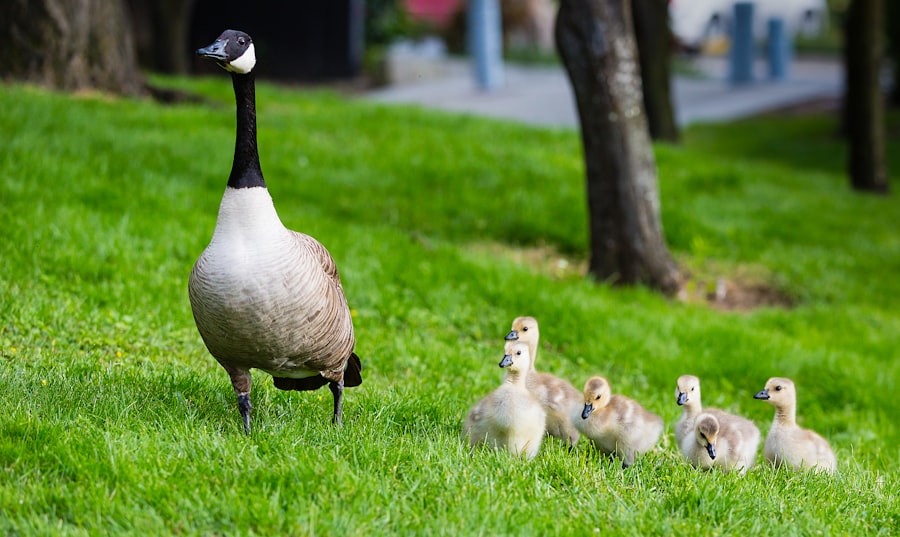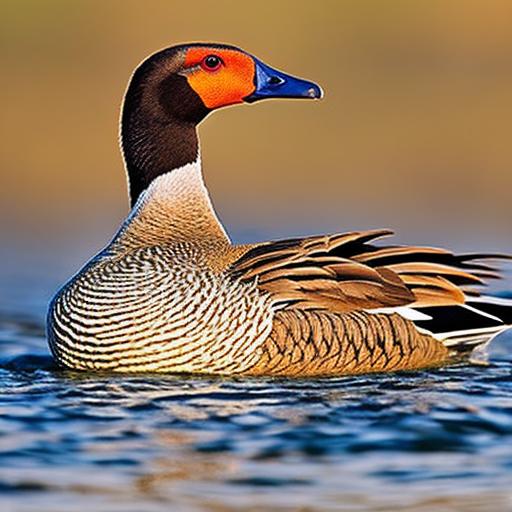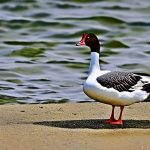Geese are a common sight in many public spaces and on private property, but their presence can often become a nuisance. They leave behind droppings that can be unsightly and unsanitary, and their aggressive behavior can pose a threat to people, especially children. Finding humane and effective solutions to deter geese is important for maintaining the cleanliness and safety of these spaces. In this article, we will explore various methods to keep geese away, including understanding their behavior, natural deterrents, repellents, physical barriers, electronic devices, geese hazing, the role of dogs, landscaping techniques, and hiring professional geese control services.
Key Takeaways
- Understanding the behavior of geese is crucial in keeping them away
- Geese control is important in public spaces to maintain cleanliness and safety
- Natural methods like landscaping and habitat modification can deter geese
- Repellents have pros and cons, including potential harm to other wildlife
- Physical barriers like fencing and netting can effectively keep geese out
Understanding the Behavior of Geese: A Key to Keeping Them Away
To effectively deter geese, it is important to understand their behavior patterns and habits. Geese are social animals that prefer to live in large groups called flocks. They are attracted to open spaces with easy access to water and food sources. Geese are also territorial creatures and will defend their nesting sites aggressively. By understanding these behaviors, we can use this knowledge to deter geese from public spaces and private property.
The Importance of Geese Control in Public Spaces
The presence of geese in public spaces can pose health and safety concerns. Their droppings contain bacteria that can contaminate water sources and cause diseases such as E.coli and salmonella. Geese also have a tendency to become aggressive when they feel threatened or when protecting their nests, which can be dangerous for people, especially children. Additionally, the excessive presence of geese in public spaces can have an economic impact on businesses and communities. The droppings can damage property and deter visitors from frequenting these areas.
Natural Methods to Keep Geese Away from Your Property
There are several natural methods that can be used to keep geese away from your property. Landscaping techniques such as planting tall grasses and shrubs can create an environment that is less attractive to geese. Geese prefer open spaces where they have a clear line of sight, so creating barriers with landscaping can discourage them from landing and staying on your property. Water deterrents, such as motion-activated sprinklers or floating decoys, can also be effective in deterring geese. The sound of running water or the presence of a predator decoy can make geese feel unsafe and encourage them to find another location.
Using Repellents to Deter Geese: Pros and Cons
There are various types of repellents available on the market that claim to deter geese. These repellents can be in the form of sprays, gels, or granules that are applied to the areas where geese are unwanted. While repellents can be effective in the short term, they may need to be reapplied regularly to maintain their effectiveness. Additionally, some repellents may contain chemicals that can be harmful to the environment or other animals. It is important to carefully consider the pros and cons of using repellents before deciding to use them as a method of geese control.
Physical Barriers: Fencing and Netting to Keep Geese Out

Physical barriers such as fencing and netting can be effective in keeping geese out of specific areas. Fencing can be installed around ponds or other water sources to prevent geese from accessing them. The height and design of the fence should be considered to ensure that it is tall enough to deter geese from flying over it. Netting can also be used to cover areas where geese are unwanted, such as gardens or rooftops. However, it is important to regularly inspect and maintain these barriers to ensure that they remain effective.
Electronic Devices: Effective Tools to Scare Geese Away
Electronic devices such as sonic repellers or laser devices can be effective in scaring geese away. Sonic repellers emit loud noises or predator calls that can startle geese and encourage them to leave the area. Laser devices emit a bright light that can disorient geese and make them feel unsafe. These devices can be effective in deterring geese, but they may need to be used in conjunction with other methods to achieve long-term results.
Geese Hazing: A Humane Way to Keep Them at Bay
Geese hazing is a humane method of geese control that involves using trained dogs or other animals to scare geese away. The presence of a dog can make geese feel threatened and encourage them to find another location. This method is effective because it utilizes the natural instincts of geese to avoid predators. However, it is important to ensure that the dog is properly trained and under control at all times to prevent harm to the geese or other animals.
The Role of Dogs in Geese Control
Dogs can be trained to deter geese from public spaces and private property. Certain breeds, such as Border Collies, are particularly effective in herding and chasing geese away. Dogs can be trained to respond to specific commands or cues that signal them to chase the geese. However, it is important to consider the pros and cons of using dogs for geese control. Dogs require regular training and maintenance, and their presence may not be suitable for all environments or situations.
Creating a Goose-Free Environment: Tips for Landscaping and Maintenance
In addition to using specific deterrent methods, there are several landscaping techniques and maintenance tips that can help create a goose-free environment. Planting tall grasses or shrubs can create barriers that discourage geese from landing and staying on your property. Regularly removing food sources, such as fallen berries or seeds, can also help deter geese from frequenting your property. It is important to regularly inspect and maintain these landscaping features to ensure their effectiveness.
Working with Professionals: Hiring Geese Control Services
If all else fails, or if the geese problem is too large to handle on your own, it may be necessary to hire professional geese control services. These professionals have the knowledge and experience to effectively deter geese from public spaces and private property. When considering hiring a professional, it is important to look for a company that has a proven track record of success and uses humane methods of geese control. They should also be able to provide references and testimonials from satisfied customers.
In conclusion, finding humane and effective solutions to deter geese is important for maintaining the cleanliness and safety of public spaces and private property. Understanding the behavior of geese is key to implementing effective deterrent methods. Natural methods such as landscaping techniques, water deterrents, and sound deterrents can be effective in keeping geese away. Repellents, physical barriers, electronic devices, geese hazing, the use of dogs, and proper landscaping and maintenance techniques can also help create a goose-free environment. If all else fails, hiring professional geese control services may be necessary. By taking action to deter geese in a humane and effective way, we can create spaces that are clean, safe, and enjoyable for everyone.
If you’re looking for effective ways to keep geese away, you might also be interested in learning about the best vegetables that quails eat. Quails are small birds that make great additions to any backyard flock. They have specific dietary needs, and knowing what vegetables they enjoy can help ensure their health and happiness. Check out this informative article on poultrywizard.com to discover the ideal vegetables to include in your quail’s diet. While you’re there, you can also explore other helpful articles such as tips on choosing the right chicken coop like the Producers Pride Sentinel Chicken Coop (poultrywizard.com) and determining how many chickens you need for a family of four (poultrywizard.com). Happy reading and happy poultry keeping!
FAQs
What are some effective ways to keep geese away?
There are several effective ways to keep geese away, including using decoys, installing fencing, using repellents, and modifying the landscape.
What are some natural repellents that can be used to keep geese away?
Some natural repellents that can be used to keep geese away include grape concentrate, garlic, and hot pepper spray.
What are some non-lethal methods of keeping geese away?
Non-lethal methods of keeping geese away include using noise deterrents, such as air horns or whistles, and using visual deterrents, such as reflective tape or scarecrows.
What are some reasons why geese may be attracted to a particular area?
Geese may be attracted to a particular area because of the presence of water, food sources, or suitable nesting sites.
What are some potential health risks associated with geese?
Geese can carry diseases such as avian influenza and salmonella, and their droppings can contain harmful bacteria. It is important to take precautions when dealing with geese to avoid potential health risks.
Is it legal to harm or kill geese?
In most cases, it is illegal to harm or kill geese without a permit. It is important to check with local authorities before taking any action to keep geese away.
Meet Walter, the feathered-friend fanatic of Florida! Nestled in the sunshine state, Walter struts through life with his feathered companions, clucking his way to happiness. With a coop that’s fancier than a five-star hotel, he’s the Don Juan of the chicken world. When he’s not teaching his hens to do the cha-cha, you’ll find him in a heated debate with his prized rooster, Sir Clucks-a-Lot. Walter’s poultry passion is no yolk; he’s the sunny-side-up guy you never knew you needed in your flock of friends!







